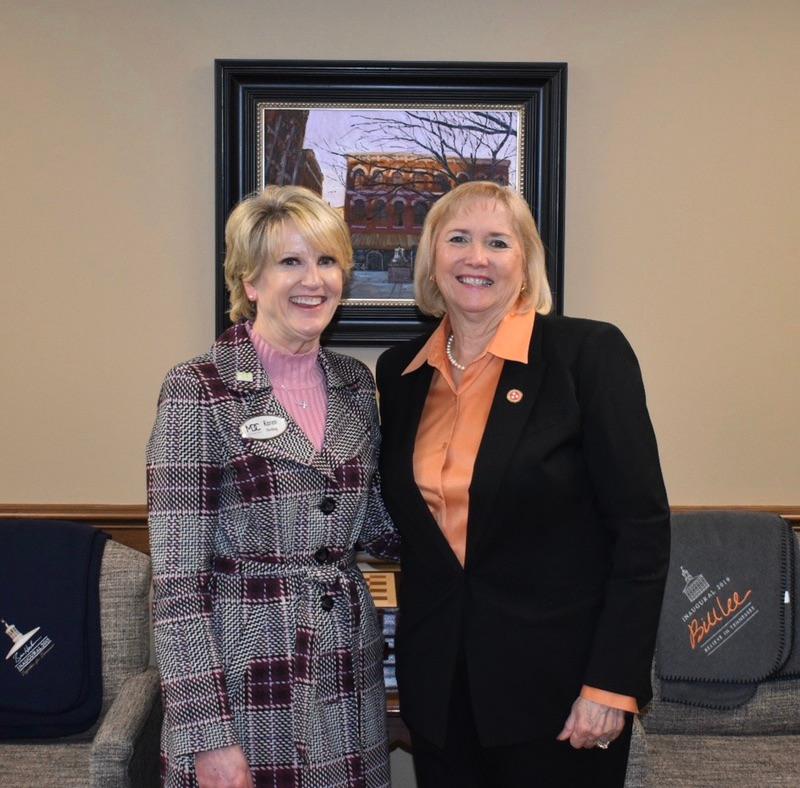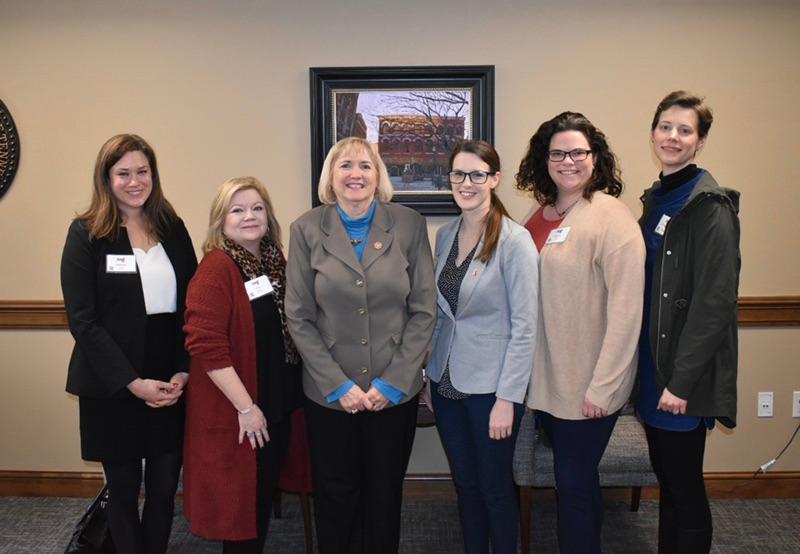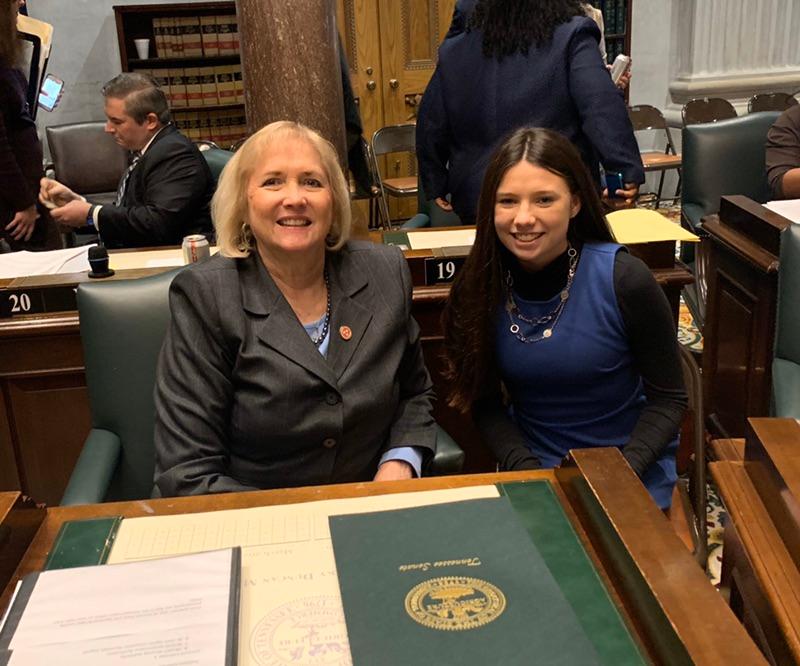
Senate approves legislation to improve transportation options for Tennesseans with disabilities and the elderly
Legislation designed to improve transportation options for Tennesseans with disabilities and the elderly was approved by the Senate on Thursday. The Tennessee Accessible Transportation and Mobility Act of 2020, which I am the sponsor, creates an office within the Tennessee Department of Transportation to focus solely on expanding and improving accessible transportation across the state. It would be the first of its kind in the United States.
Research and experiences confirm that the lack of accessible transportation is the number one barrier for people with disabilities. The bill works to identify and remove those barriers so people with disabilities have opportunities to improve their quality of life through greater access to education, employment, health care, housing, and community life. Only 25 percent of people with disabilities are employed, many due to transportation barriers.
Senate Bill 1612 requires the new Office for Accessible Transportation to do an assessment to identify transportation challenges in coordination with all appropriate state and local agencies. The office will consult with accessible transportation consumers and industry professionals. The office is also tasked with constructing a five-year strategic plan and will report back to the General Assembly’s Transportation Committee regarding needs for mobility and accessible transportation annually.
The legislation is pending action in the House of Representatives where it will be heard in the House Finance, Ways, and Means Committee on Tuesday.

I had a great group visit from Sertoma Center on the disability providers day on the hill.
Lawmakers join Governor Lee to Introduce Constitutional Carry Legislation
Members of the General Assembly joined Governor Bill Lee at a press conference on Thursday to announce major legislation cracking down on criminals who steal guns or possess them illegally, while allowing law-abiding citizens to exercise their constitutional right to carry firearms without a permit. The move would make Tennessee the 17th state in the nation to pass a “constitutional carry” law.
When amended, Senate Bill 2671 will allow law-abiding citizens in Tennessee who are at least 21 years old to carry a firearm without a permit, except in restricted areas. The legislation also includes increased penalties for firearm-related crime to promote public safety including:
Increasing the penalty for theft of a firearm to a felony;
Providing a sentencing enhancement for theft of a firearm in a car;
Increasing the minimum sentence for theft of a firearm from 30 days to 180 days; and
Increasing the sentences for unlawful possession of a firearm by violent felons and felony drug offenders, possession of a handgun by a felon, and unlawfully providing a handgun to a juvenile or allowing a juvenile to possess a handgun.
“This legislation is about increasing freedom for law-abiding citizens and implementing harsher penalties for criminals,” said Governor Lee. “You don’t crack down on crime by penalizing law-abiding citizens. You crack down on crime by penalizing criminals,” he added.
Under the bill, those who carry without a permit must still meet current requirements used to determine eligibility for a permit holder. Among those eligibility requirements are that persons who carry have no felony convictions, orders of protection in effect, misdemeanor domestic violence convictions, or stalking convictions.
The bill has been referred to the Senate Judiciary Committee for consideration where it is scheduled for a hearing this Tuesday.

I always enjoy my visit with Karen Pershing, Knoxville Metro Drug Coalition
Senate Judiciary Committee approves Holly Bobo Act
Legislation allowing the Tennessee Bureau of Investigation (TBI) to expand its missing and endangered child and young adult alert program to individuals under the age of 21 was approved by the Senate Judiciary Committee on Tuesday. Senate Bill 2464 is named the “Holly Bobo Act” for a 20-year-old young woman who was kidnapped from her Darden, Tennessee home and murdered in 2011.
Currently, endangered child alerts are issued for abduction of persons under the age of 18.
In issuing an Endangered Child Alert, which is distinct from the America’s Missing Broadcast Emergency Response (AMBER) Alert, the TBI notifies local media in specific regions of the state about the missing person, along with any additional information which is available. They also share the information on social media. The National Crime Information Center claims that 73 percent of missing persons are 20 years of age or under. The bill now moves to the Senate floor for final consideration.
Legislation seeks to increase access to food for Tennesseans in need
Two bills addressing access to food for Tennesseans in need advanced in Senate Committees this week. This includes approval by the Senate Commerce Committee of the Healthy Food Financing Act, establishing a statewide program to increase access to fresh fruits and vegetables in underserved communities, specifically those located in inner cities.
According to a study by the Tennessee Advisory Commission on Intergovernmental Relations (TACIR), 21 percent of the state’s population lives in areas considered food deserts – 15 percent in urban food deserts and 6 percent in rural food deserts. Senate Bill 1619 aims to incentivize grocery stores to locate in inner cities by establishing the Healthy Foods Financing Fund. The fund would offer state, federal and private grants and loans, as well as federal tax cuts and other forms of financial assistance, to construct, rehabilitate, or expand grocery stores in underserved communities.
In order to qualify for the program, an applicant must meet certain guidelines. These include allocating at least 30 percent of food retail space for the sale of perishable goods, promoting the hiring of local residents, and demonstrating the capacity to successfully implement the project with the likelihood it will be economically self-sustaining.
The second bill clarifies Tennessee’s laws regarding donations to encourage companies and organizations to donate healthy food that would otherwise go to waste. A large portion of uneaten food is wholesome and safe for consumption and can be donated to citizens who suffer from food insecurity. However, Tennessee’s current laws have created uncertainty regarding donor liability for food donations.
Senate Bill 2154 aligns Tennessee’s donor liability protection standard with the federal standard of gross negligence. It explicitly allows liability protection for the donation of past-date foods and extends liability protection to individuals and organizations that donate directly to individuals for personal use, as long as the food is apparently wholesome and fit for human consumption at the time of distribution. Donated food must also meet the standards of the Tennessee Food, Drug and Cosmetic Act.
The overall goal of this bill is to encourage the donation of food and grocery products to nonprofit organizations for distribution to needy individuals, which in turn reduces unnecessary waste in our landfills. According to a study from Feeding America, one in seven Tennesseans, and one in five children, is considered food insecure. Over 40 percent of all food produced in the United States goes to waste, of which 98 percent goes to landfills.

I enjoyed my visit with the Physician Assistant students from South College
In other action…
Lee administration is working daily to prepare for potential coronavirus cases in Tennessee — On Thursday, Tennessee Governor Bill Lee addressed how his administration is preparing for a potential coronavirus outbreak in Tennessee. “The most important thing we can do is be prepared,” said Lee.
Tennessee Department of Health Commissioner Dr. Lisa Piercey is working to develop a coordinated response with the Tennessee Emergency Management Agency (TEMA) and other local, statewide and federal agencies. Gov. Lee says he met with Centers for Disease Control and Prevention (CDC) officials during a trip to Washington, D.C. a few weeks ago and his administration interacts daily with health and federal officials. He also stressed his administration will be transparent in reporting any cases if or when one is diagnosed in the state.
As of late last week, there have been 14 Americans that have tested positive for the coronavirus according to the CDC. Of those testing positive, 12 were related to travel and two have been spread by person-to-person transmission. The Lee administration has scheduled a meeting this week to bring local, state, and federal teams together to continue developing a plan and strategy to be prepared and will be having a conference call to update legislators.
Legislation protects the confidentiality of communications of sexual and domestic violence victims so they will seek needed services — Legislation advanced through the Senate Judiciary Committee protecting the confidentiality of communications between a victim of rape, human trafficking, or domestic abuse and their sexual violence advocate or counselor. Senate Bill 2742 encourages victims to seek needed services in a safe environment by making communications between victims and advocates who specialize in victim assistance subject to confidential privilege from any judicial, legislative, or administrative proceedings. The confidentiality would apply unless the victim waives this right through written permission.
Thirty-seven states already protect certain communications from disclosure in court. The expansion to volunteer advocates and employees of domestic violence shelters, crisis lines or victim’s services centers allows protection outside of the traditional patient-psychotherapist relationship that may not be an accessible or affordable option to many victims of domestic violence and sexual assault. Such action reinforces the long-standing ethical duty to protect a survivor’s control over personal information. The bill now moves to the Senate floor for final consideration.
Bill allowing counties without regional planning commission to open or close roads comes to Senate floor— The full Senate approved legislation allowing 25 Tennessee counties without a Regional Planning Council to create a committee that can open, change or close certain roads in that county. Senate Bill 1734 allows the local county commission, by a two-thirds vote, to set up a five-member committee of the commissioners to only hear opening, changing and closing of roads.
Legislation to ban convicted animal abusers from owning pets for two years approved by Senate — Final approval was given to legislation last week which bans some convicted animal abusers from owning any pets again. Senate Bill 1747 prohibits individuals convicted of some of the worst offenses against animals from owning companion animals for at least two years from the date of conviction and may impose a lifetime prohibition. Upon a subsequent offense, the court shall prohibit the individual from having custody of any companion animal for the person’s lifetime. The measure builds on a 2015 law that created the Tennessee Animal Abuse Registry, the first ever animal abuse registry in the nation.
Legislation requires creation of a bank of possible TCAP questions to help teachers prepare their students — Legislation giving teachers more tools to help them prepare their students for end-of-year assessments has received final Senate approval. Senate Bill 1946 requires the Department of Education (DOE) to release a bank of possible Tennessee Comprehensive Assessment Program (TCAP) questions to local education agencies (LEAs) that are aligned to the current assessments. The bill requires the DOE commissioner to begin developing the question bank no later than July 1, 2020.
ECD Commissioner talks about New Jobs Report Card and efforts to expand broadband — Commissioner of Economic and Community Development Bob Rolfe appeared before the Senate Commerce and Labor Committee last week where he presented his department’s New Jobs Report Card for 2019. Last year, Tennessee secured 104 new projects, yielding a commitment of over 14,300 jobs and representing $3.3 billion in capital expenditures. Approximately 4,400 of these new job commitments were from foreign-owned businesses who directly invested $1.4 billion for 34 projects.
Rolfe also talked about the state’s Broadband Accessibility Grants which were distributed through his department in 2019. Since 2018, TNECD has awarded more than $25 million in broadband accessibility grants to support projects within 30 Tennessee counties. The department anticipates announcing nearly $20 million worth of additional broadband grants this spring.
The department announced that Tennessee’s broadband initiatives are highlighted in a new report released last week by the Pew Charitable Trusts. The report, ‘How States are Expanding Broadband Access,’ features best practices from nine states that are developing leading broadband programs to address critical connectivity gaps in their communities.
Tennessee’s best practices include the Department of Economic and Community Development’s broadband accessibility grant program; the broadband adoption program; a partnership with the Tennessee State Library and Archives to fund digital literacy instruction; and the change in legislation that permits electric cooperatives to provide retail broadband.
Lawmakers are considering increasing broadband accessibility through an additional $25 million investment as part of the 2020-2021 fiscal year budget. This would add to the significant investments phased in over the past four years.
Bill to expand Health Care Empowerment Act to all medical professionals passes Senate committee — The Senate Health and Welfare Committee voted this week to expand Tennessee’s Health Care Empowerment Act to allow all licensed medical professionals, instead of only physicians, to use direct medical care agreements without regulation by the insurance laws of this state.
The Health Care Empowerment Act is designed to give healthcare consumers who are struggling to pay the increasing costs of premiums or who have been priced out of the market, an affordable option to contract directly with their physician for primary care services. Senate Bill 2317 holds that a person seeking medical care outside of an insurance plan, TennCare or Medicare programs and chooses to pay out of pocket, does not forfeit their coverage plan. The bill passed 7-0 and now moves to the full Senate for a final vote.
Legislation creates new judicial district for Tennessee — The Senate overwhelmingly approved legislation on Thursday creating a new judicial district in Tennessee. Senate Bill 561 adds District 32 to the state’s judicial districts, serving the citizens of Hickman, Lewis, and Perry Counties. Currently, the counties are comprised in the 21st district, along with Williamson County. The measure allows Williamson County to become its own standalone judicial district.
Action on the bill follows recommendations made by the Advisory Task Force on Composition of Judicial Districts which was created by lawmakers in 2018 to increase resources to the state’s judicial system. The 32nd Judicial District will allow for more specialized legal attention to better address the unique needs of citizens in these counties by reducing the backlog of court cases currently on the books because of exponential growth. The measure now goes to Governor Bill Lee for his signature.
Legislation seeks to support veterans in crisis — Legislation seeking to support and protect Tennessee veterans was given final approval in the Senate last Thursday. Senate Bill 673 requires the Department of Veterans Services (DVS) to provide training in suicide prevention to their employees who directly interact with veterans. The training is available free of charge to DVS through suicide prevention networks. The measure now goes to Governor Lee for his signature before becoming law.
Legislation calls for more accepted alternative pain treatments to opioids — Legislation encouraging the use of more alternative pain treatments rather than opioids has been approved by the full Senate. Senate Bill 1912 amends the state’s opioid reform legislation to include medical devices like pain pumps, spinal cord stimulators, occupational therapy and non-opioid medicinal drugs as non-opioid based alternative therapies for chronic pain. This legislation adds to a new 2019 law calling for chiropractic care, physical therapy, acupuncture, and other treatments to be encouraged for pain relief before opioids are dispensed. Both measures are part of an ongoing effort in Tennessee to provide alternative pathways to treat pain in order to curb opioid addiction, which has claimed the lives of thousands of Tennesseans.

Advocates with the Cancer Action Network updated me on issues of importance to them

Representatives of Postively Living stopped by for a visit

I enjoyed visiting with Knoxvillians at the Tennessee Press Association reception

It was a special treat to visit Sequoyah Elementary and present them with a Proclamation from the Tennessee State Senate honoring their recognition nationally as a Blue Ribbon School-one of only 6 in Tennessee.

I enjoyed having Molly Robinson (Bearden High School) as my Page for the Day.
For information on State Senators including phone numbers and email addresses, click Tennessee State Senators.
For House members, click Tennessee House Members
For all other information on the General Assembly including legislation, schedules and videos, click Tennessee General Assembly
As always thank you for continued support!
Sincerely,
Becky Massey
District 6 Senator
615-741-1648.
